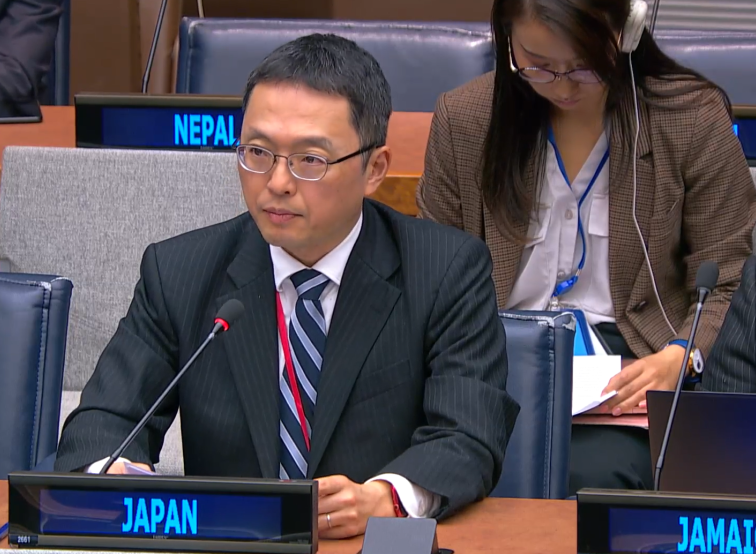Statement by Mr. ONO Sho, Minister, Permanent Mission of Japan to the United Nations, at the General Debate of the Fourth Committee, Agenda Item 46: Assistance in Mine Action
2023/10/12

(As delivered)
Thank you, Mr. Chair.
Mines are a serious threat to human security. It was the human security concerns advocated by civil society that paved the way for the adoption of the Ottawa Convention and its entry into force in 1999.
Despite significant progress over the past two decades, landmines continue to threaten the lives, livelihoods and dignity of civilians and hinder the realization of human security.
Today, we face new challenges such as the rapidly increasing number of casualties due to improvised explosive devices and extreme weather events that move mines and create new hazards for civilians.
The draft resolution on Assistance in Mine Action stresses the need to address these emerging threats and the importance of the continued support for mine action programmes. As one of the co-sponsors, Japan supports this draft resolution and hopes that it will be adopted by consensus. We also thank the delegation of Poland for their dedication and leadership on this important resolution.
Mr. Chair,
Japan has long made mine action support a priority and has three areas of focus. First, sustained assistance to clearance activities in countries with serious landmine and unexploded ordnance (UXO) damage; second, promotion of regional and South-South cooperation; and third, comprehensive assistance for victims of landmines and unexploded ordnance.
In 2022, Japan provided a total of more than 52 million USD in assistance, distributed across 22 countries through the ICRC, UNMAS, and other international organizations and NGOs. Japan’s experience in providing mine action support has revealed that triangular cooperation is particularly effective.
For example, Japan and Cambodia have partnered to support landmine clearance in Ukraine, taking advantage of Cambodia’s expertise in the field. In January and July this year, the Japan International Cooperation Agency (JICA) and the Cambodian Mine Action Center (CMAC), to which Japan has provided capacity-building support for more than 20 years, conducted the mine action training on the use of the Advanced Landmine Imaging System (ALIS) for State Emergency Service of Ukraine (SESU).
Mr. Chair,
The year 2025 marks a significant moment for all of us in our pursuit of a mine-free world, and Japan has decided to seek the Presidency of the Anti-Personnel Mine Ban Convention (APMBC) in 2025. Japan has been a staunch supporter of this convention since its inception and remains committed to playing an active role, through utilizing its expertise. Japan will continue to support mine action in collaboration with the United Nations, Member States and civil society organizations.
I thank you.
Mines are a serious threat to human security. It was the human security concerns advocated by civil society that paved the way for the adoption of the Ottawa Convention and its entry into force in 1999.
Despite significant progress over the past two decades, landmines continue to threaten the lives, livelihoods and dignity of civilians and hinder the realization of human security.
Today, we face new challenges such as the rapidly increasing number of casualties due to improvised explosive devices and extreme weather events that move mines and create new hazards for civilians.
The draft resolution on Assistance in Mine Action stresses the need to address these emerging threats and the importance of the continued support for mine action programmes. As one of the co-sponsors, Japan supports this draft resolution and hopes that it will be adopted by consensus. We also thank the delegation of Poland for their dedication and leadership on this important resolution.
Mr. Chair,
Japan has long made mine action support a priority and has three areas of focus. First, sustained assistance to clearance activities in countries with serious landmine and unexploded ordnance (UXO) damage; second, promotion of regional and South-South cooperation; and third, comprehensive assistance for victims of landmines and unexploded ordnance.
In 2022, Japan provided a total of more than 52 million USD in assistance, distributed across 22 countries through the ICRC, UNMAS, and other international organizations and NGOs. Japan’s experience in providing mine action support has revealed that triangular cooperation is particularly effective.
For example, Japan and Cambodia have partnered to support landmine clearance in Ukraine, taking advantage of Cambodia’s expertise in the field. In January and July this year, the Japan International Cooperation Agency (JICA) and the Cambodian Mine Action Center (CMAC), to which Japan has provided capacity-building support for more than 20 years, conducted the mine action training on the use of the Advanced Landmine Imaging System (ALIS) for State Emergency Service of Ukraine (SESU).
Mr. Chair,
The year 2025 marks a significant moment for all of us in our pursuit of a mine-free world, and Japan has decided to seek the Presidency of the Anti-Personnel Mine Ban Convention (APMBC) in 2025. Japan has been a staunch supporter of this convention since its inception and remains committed to playing an active role, through utilizing its expertise. Japan will continue to support mine action in collaboration with the United Nations, Member States and civil society organizations.
I thank you.
